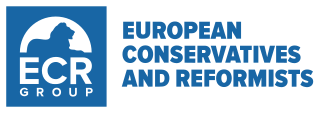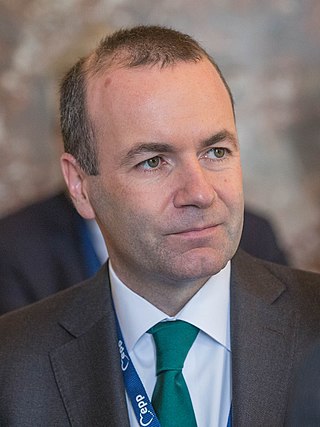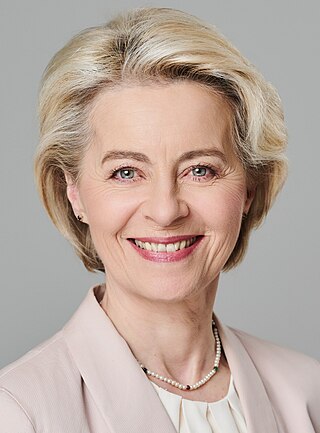Related Research Articles

The European Parliament (EP) is one of the legislative bodies of the European Union and one of its seven institutions. Together with the Council of the European Union, it adopts European legislation, following a proposal by the European Commission. The Parliament is composed of 705 members (MEPs), due to rise to 720 after the June 2024 European elections. It represents the second-largest democratic electorate in the world, with an electorate of around 375 million eligible voters in 2024; India's electorate is 968 million.

The European People's Party Group is a centre-right to right wing political group of the European Parliament consisting of deputies (MEPs) from the member parties of the European People's Party (EPP). Sometimes it also includes independent MEPs and/or deputies from unaffiliated national parties. The EPP Group comprises politicians of Christian democratic, conservative and liberal-conservative orientation.
The Left in the European Parliament – GUE/NGL is a left-wing political group of the European Parliament established in 1995. Before January 2021, it was named the European United Left/Nordic Green Left.

The European Commission (EC) is part of the executive of the European Union (EU). It operates as a cabinet government, with 27 members of the Commission headed by a President. It includes an administrative body of about 32,000 European civil servants. The commission is divided into departments known as Directorates-General (DGs) that can be likened to departments or ministries each headed by a Director-General who is responsible to a Commissioner.

The president of the European Commission is the head of the European Commission, the executive branch of the European Union (EU). The president of the commission leads a cabinet of commissioners, referred to as the college. The president is empowered to allocate portfolios among, reshuffle, or dismiss commissioners as necessary. The college directs the commission's civil service, sets the policy agenda and determines the legislative proposals it produces. The commission is the only body that can propose or draft bills to become EU laws.

A member of the European Parliament (MEP) is a person who has been elected to serve as a popular representative in the European Parliament.

Non-Inscrits are Members of the European Parliament (MEPs) who do not belong to one of the recognised political groups.

The European People's Party (EPP) is a European political party with Christian democratic, liberal-conservative, and conservative member parties. A transnational organisation, it is composed of other political parties. Founded by primarily Christian-democratic parties in 1976, it has since broadened its membership to include liberal-conservative parties and parties with other centre-right political perspectives. On 31 May 2022, the party elected as its President Manfred Weber, who was also EPP's Spitzenkandidat in 2019.

A European political party, known formally as a political party at European level and informally as a Europarty, is a type of political party organisation operating transnationally in Europe and within the institutions of the European Union (EU). They are regulated and funded by EU Regulation 1141/2014 on the statute and funding of European political parties and European political foundations, and their operations are supervised by the Authority for European Political Parties and European Political Foundations (APPF).

Elections to the European Parliament take place every five years by universal adult suffrage; with more than 400 million people eligible to vote, they are the second largest democratic elections in the world after India's.

The political groups of the European Parliament are the officially recognised parliamentary groups consisting of legislators of aligned ideologies in the European Parliament.

The political structure of the European Union (EU) is similar to a confederation, where many policy areas are federalised into common institutions capable of making law; the competences to control foreign policy, defence policy, or the majority of direct taxation policies are mostly reserved for the twenty-seven state governments. These areas are primarily under the control of the EU's member states although a certain amount of structured co-operation and coordination takes place in these areas. For the EU to take substantial actions in these areas, all Member States must give their consent. Union laws that override State laws are more numerous than in historical confederations; however, the EU is legally restricted from making law outside its remit or where it is no more appropriate to do so at a state or local level (subsidiarity) when acting outside its exclusive competences. The principle of subsidiarity does not apply to areas of exclusive competence.

Manfred Weber is a German politician who has served as President of the European People's Party (EPP) since 2022 and as Leader of the EPP Group in the European Parliament since 2014. He has been a Member of the European Parliament (MEP) from Germany since 2004. He is a member of the Christian Social Union in Bavaria (CSU), part of the European People's Party.

Roberta Metsola is a Maltese politician. A member of Malta's Nationalist Party (PN) and the European People's Party (EPP), she has been serving as president of the European Parliament since January 2022.

The European Conservatives and Reformists (ECR) is a soft Eurosceptic, anti-federalist political group of the European Parliament. The ECR is the parliamentary group of the European Conservatives and Reformists Party European political party (formerly known as the Alliance of Conservatives and Reformists in Europe or Alliance of European Conservatives and Reformists, but also includes MEPs from four other European parties and thirteen MEPs without European party affiliation.

The European Conservatives and Reformists Party, formerly known as Alliance of European Conservatives and Reformists and Alliance of Conservatives and Reformists in Europe, is a conservative, soft Eurosceptic European political party with a main focus on reforming the European Union (EU) on the basis of Eurorealism, as opposed to total rejection of the EU (anti-EU-ism).

The Progressive Alliance of Socialists and Democrats (S&D) is the political group in the European Parliament of the Party of European Socialists (PES). The Progressive Alliance of Socialists and Democrats was officially founded as a Socialist Group on 29 June 1953, which makes it the second oldest political group in the European Parliament after the European People's Party Group. It adopted its present-day name on 23 June 2009. Centre-left in orientation, the group mostly comprises social-democratic parties and is affiliated with the Progressive Alliance and Socialist International.

The 2019 European Parliament election was held between 23 and 26 May 2019, the ninth parliamentary election since the first direct elections in 1979. A total of 751 Members of the European Parliament (MEPs) represent more than 512 million people from 28 member states. In February 2018, the European Parliament had voted to decrease the number of MEPs from 751 to 705 if the United Kingdom were to withdraw from the European Union on 29 March 2019. However, the United Kingdom participated alongside other EU member states after an extension of Article 50 to 31 October 2019; therefore, the allocation of seats between the member states and the total number of seats remained as it had been in 2014.
Identity and Democracy is a political group of the European Parliament, launched on 13 June 2019 for the Ninth European Parliament term. It comprises Eurosceptic national parties from ten European states. It is the successor to the Europe of Nations and Freedom group formed during the eighth term.

The 2024 European Parliament election took place from 6 to 9 June. It was the tenth parliamentary election since the first direct elections in 1979, and the first European Parliament election after Brexit. In September 2023, the European Council increased the number of MEPs from 705 to 720.